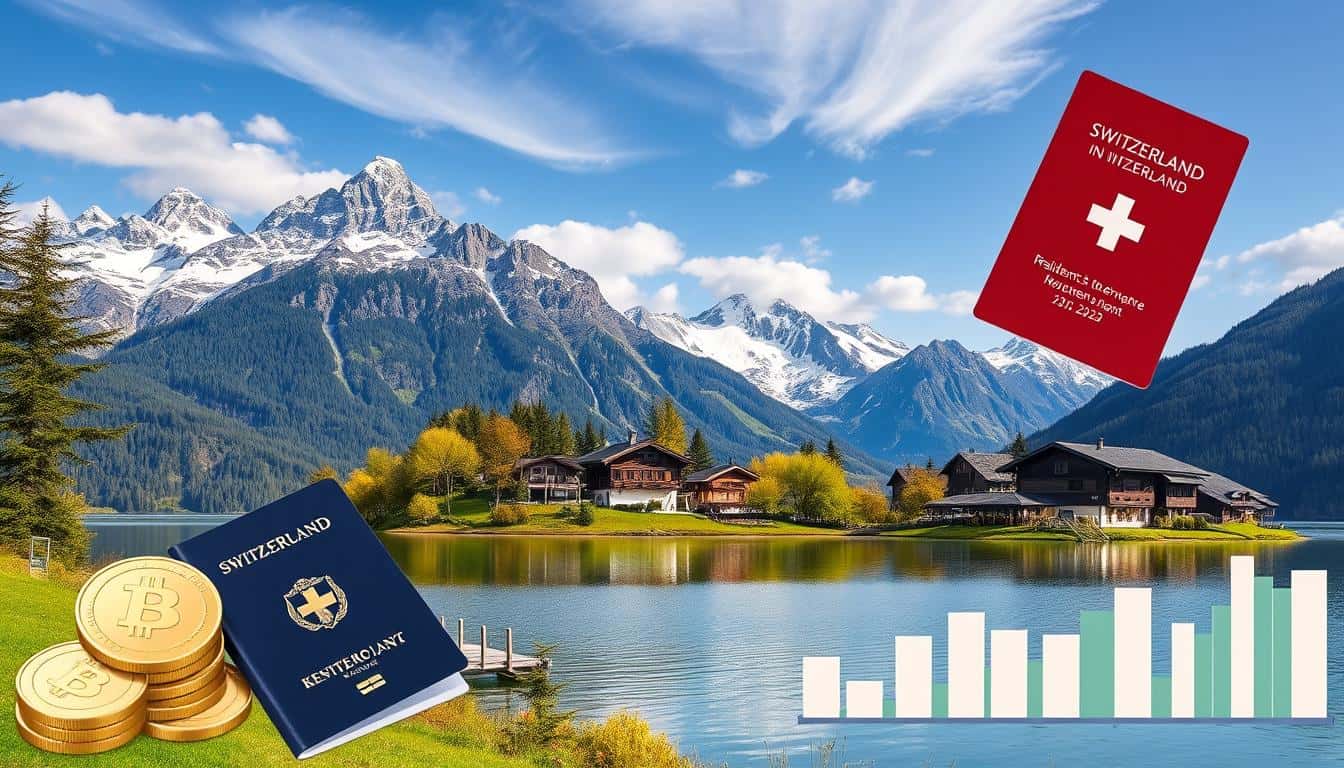Swiss Residency by Investment
Boost Your Freedom Without Compromise.
- Who offers the CHEAPEST program available.
- Who offers the BEST program available.
- What you need to qualify?

Key Takeaways
- Switzerland offers multiple investment-based residency options, including lump-sum taxation and business investment routes, with minimum contributions typically starting from CHF 250,000 to CHF 500,000 annually, depending on canton and negotiated lifestyle expenses1.
- As of March 2025, 496 non-EU/EEA nationals are living in Switzerland under the lump-sum tax regime, an increase of 22% over the previous year, with British nationals accounting for 10% of this group2.
- Lump-sum taxation fuels a path to permanent residency and citizenship: B‑Permit holders under this scheme can apply for a C‑Permit after five to ten years, with naturalisation possible after 12 years of residence3.
Switzerland maintains its appeal among high-net-worth individuals, with 496 non-EU/EEA nationals residing under its lump‑sum tax regime as of March 2025, a 22 percent increase from 2023. British nationals accounted for roughly 10 percent of these residents4.
Switzerland offers specific investment-based routes to residency, including business investment programs and lump‑sum taxation agreements, with annual tax liabilities commonly negotiated between CHF 250,000 and CHF 500,000, depending on the canton5.
In This Article, You Will Discover:
This guide provides clear, actionable information on Switzerland’s investor residency pathways: the precise investment requirements, residency types, and tax implications, so you can assess whether strategic investment in Switzerland makes sense for your long-term plans.
- Who offers the CHEAPEST program available.
- Who offers the BEST program available.
- What you need to qualify?
 Free Consultation
Free Consultation Easy to Use
Easy to Use 100% Safe & Secure
100% Safe & Secure
What Are the Swiss Residency by Investment Options?
Switzerland provides a structured, legal pathway to residency for high-net-worth individuals through two primary programs: lump-sum taxation residency and investment via business establishment.
These routes are designed for economically self-sufficient applicants who can demonstrate financial contribution or local economic value, without the need for employment or government bonds.
1. Lump-Sum Taxation Residency
This program allows non-EU/EFTA nationals to obtain a Swiss residence permit by paying a fixed annual tax, calculated based on a negotiated multiple of their global living expenses.
The base figure typically starts at CHF 250,000, though some cantons require significantly higher minimums depending on the applicant’s lifestyle and the local tax authority’s expectations.
This route prohibits gainful employment in Switzerland but permits passive income sources.
It is commonly used by retirees, entrepreneurs, and global investors seeking lifestyle residency with minimal administrative burden.
As of 2025, around 4,500 individuals reside in Switzerland under lump-sum tax agreements.
2. Business Investor Route (Cantonal Economic Interest)
Residency can also be granted to applicants who establish or invest in a Swiss company that serves a clear economic interest, usually by creating jobs or providing innovation in the local economy.
The minimum capital commitment is usually CHF 500,000 or more, and the business must be demonstrably viable.
Applicants are required to present a detailed business plan, prove the legal origin of funds, and secure approval from cantonal immigration and economic departments.
The rules and scrutiny are typically more rigorous in urban cantons such as Zurich, Geneva, and Basel.
Comparison of Swiss Residency by Investment Options
| Program Type | Minimum Investment | Eligible Applicants | Key Requirements | Permit Issued | Path to Citizenship |
|---|---|---|---|---|---|
| Lump-Sum Taxation | CHF 250,000–CHF 1 million annually | Non-EU/EFTA nationals not employed in Switzerland | No gainful employment; proof of wealth; tax negotiated with canton | B Permit (renewable) | Possible after 10–12 years of residence with integration |
| Business Investor Route | CHF 500,000+ | Non-EU/EFTA nationals | Business plan; economic benefit; job creation; cantonal approval | B Permit (renewable) | Eligible for C Permit, then citizenship (via naturalisation) |
Note: These programs are not centrally managed at the federal level. All applications are handled by individual cantons, each with its own financial, regulatory, and linguistic environment.
Swiss residency by investment offers a long-term, secure entry point into one of Europe’s most stable, prosperous countries.
For serious investors, these programs provide not only geographic mobility but also access to Switzerland’s tax advantages, quality of life, and eventual naturalisation for those who meet residency and integration requirements.
Who Qualifies for a Swiss Investor Visa?
Switzerland does not operate a federal "Golden Visa" scheme in the conventional sense.
Instead, residency by investment is governed by two primary frameworks, each administered at the cantonal level, with strict eligibility criteria focused on economic contribution and financial independence.
Applicants must meet different qualifications depending on the chosen route.
The two primary categories are:
1. Lump-Sum Taxation (Tax-Based Residency)
This route is reserved for non-EU/EFTA nationals who agree to pay an annual fixed tax based on their cost of living in Switzerland. Eligibility depends on:
- Not engaging in gainful employment or running a business in Switzerland
- Having no prior residence or long-term stay in Switzerland
- Being over the age of 18 and financially independent
- Demonstrating a clean criminal background and good international reputation
- Being able to negotiate an annual lump-sum tax with a participating canton (typically CHF 250,000 to CHF 1 million depending on canton and lifestyle)
2. Business-Based Investment Residency
Under this route, foreign nationals must establish or invest in a business that creates long-term economic value. Requirements include:
- A minimum capital commitment of typically CHF 500,000 or more
- Creation of jobs or meaningful economic impact in the host canton
- Submission of a detailed business plan and proof of legal origin of funds
- Demonstration of experience, credibility, and capacity to execute the business plan
- Approval by cantonal immigration and economic development authorities
Comparison of Swiss Residency Investment Requirements
| Residency Route | Minimum Investment | Key Criteria |
|---|---|---|
| Lump-Sum Taxation Program | CHF 250,000–CHF 1 million annually | No gainful activity; non-EU/EFTA only; fixed tax based on lifestyle; proof of funds |
| Business Investor Residency | CHF 500,000+ | Job creation or economic value; valid business plan; source of funds; local approval |
According to IMI Daily, applicants using either route must pass cantonal and federal due diligence, including financial, legal, and reputational checks. The lump-sum tax model alone accounts for over 4,500 foreign residents in Switzerland.
Expert Note:
Terms such as Swiss Golden Visa or Swiss Investor Visa are often used informally by immigration firms but are not part of the official legal framework. Instead, eligibility is determined by cantonal authorities under federal residence law (Foreign Nationals and Integration Act – FNIA) and varies significantly between jurisdictions.
Applicants considering either route should consult a Swiss immigration lawyer or fiduciary expert to ensure they meet the current legal, financial, and documentation requirements. The complexity of the process makes professional guidance highly advisable.
What Is the Switzerland Immigrant Investor Program?

Switzerland does not operate a formal federal “Immigrant Investor Program.”
However, the term is commonly used in practice to describe the process by which high-net-worth individuals can obtain residency through substantial investment in a Swiss business that contributes to the local economy.
This pathway is governed by the Foreign Nationals and Integration Act (FNIA) and is administered at the cantonal level, with varying requirements depending on the location and economic value of the proposal.
Business Investment as a Route to Residency
This route is primarily available to non-EU/EFTA nationals who can demonstrate a credible commitment to creating long-term economic value in Switzerland.
Key conditions typically include:
- A minimum capital investment starting at approximately CHF 1 million, adjusted by the project’s scope and location
- A detailed business plan showing sustainability, innovation, or job creation within the host canton
- Documentation proving the legal origin of funds
- No criminal record and a positive outcome from Swiss due diligence checks
- Active involvement or oversight of the investment from within Switzerland
While investment amounts of CHF 10 million are sometimes promoted by agencies, there is no federally mandated threshold. Requirements are determined individually by the canton6.
Pathway to Citizenship
Swiss residency via business investment can eventually lead to citizenship, but the process is not automatic and depends on multiple legal and social factors.
To qualify, applicants must:
- Reside in Switzerland for at least 10 years
- Demonstrate meaningful integration into Swiss society, including respect for local values and active community participation
- Achieve language proficiency of A2 level (speaking) and A1 level (writing) in a national language
- Maintain a clean legal record and full compliance with immigration and tax regulations
Swiss naturalisation is discretionary and includes communal, cantonal, and federal approval stages. Applicants should expect rigorous scrutiny beyond financial contribution.
Professional Guidance Is Essential
Because each canton applies its own criteria and evaluates applications based on regional needs, it is essential to work with experienced immigration counsel and local economic advisors.
A poorly structured investment or misaligned proposal may result in rejection, even if it meets nominal capital thresholds.
How Does a Swiss Residency Permit Lead to Citizenship?
Switzerland offers a structured but gradual path from temporary residence to permanent residency and, ultimately, to citizenship.
While the process is rigorous, it is clearly defined under Swiss law and achievable for those who meet the long-term integration and residence criteria.
Types of Swiss Residency Permits
Swiss residence permits fall into two main categories:
- B Permit (Temporary Residency): Typically issued for work, family reunification, or approved investment. It is valid for one year (renewable), with limitations on employment, canton of residence, or both.
- C Permit (Permanent Residency): Grants indefinite stay with fewer restrictions. C Permit holders can change jobs, move between cantons, and apply for social integration benefits. It is the final step before naturalisation.
According to the Swiss State Secretariat for Migration, the C Permit is usually granted after 10 years of continuous legal residence, or 5 years in certain cases for nationals from countries with bilateral agreements, such as the United Kingdom.
Requirements for Permanent Residency (C Permit)
To obtain a C Permit, applicants must meet specific legal and integration standards:
- 10 years of continuous residence in Switzerland (time with a B Permit counts; years between ages 8–18 count double)
- Proven financial independence and clean criminal record
- Language proficiency of at least A2 speaking and A1 writing in one of the four national languages
- Successful integration into Swiss society, shown through community involvement, employment, or school participation
- Respect for Swiss legal order and democratic values
Cantons may impose additional integration tests or documentation, depending on local policies.
From Permanent Residency to Citizenship
Swiss citizenship is not granted automatically after obtaining a C Permit. Applicants must apply for ordinary naturalisation, which requires:
- 12 years of residence, including 3 of the last 5 years prior to application
- Continued integration, financial responsibility, and civic engagement
- Language proficiency at the B1 spoken / A2 written level
- Approval by communal, cantonal, and federal authorities
The process varies slightly by canton but is highly decentralised, and communal integration is often a decisive factor.
Expert Insight:
Obtaining a Swiss C Permit is a key milestone for any investor or long-term resident.
It allows greater mobility within the country and forms the legal foundation for naturalisation.
However, both C Permit issuance and citizenship depend on demonstrable commitment to Swiss society, not just time spent in the country.
What Are the Tax Benefits of Swiss Investor Residency?
Switzerland offers an internationally respected and investor-friendly tax regime that can be highly advantageous for high-net-worth individuals.
While ordinary income tax rates can be high, Switzerland provides alternative tax arrangements for eligible foreign residents, particularly under the lump-sum taxation system, which is available in several cantons.
Understanding Switzerland’s Tax Options for Foreign Investors
For most Swiss taxpayers, income is taxed on a progressive basis at three levels: federal, cantonal, and communal.
The combined effective income tax rate for high earners varies widely by canton but typically ranges from 22 percent to 35 percent, not 40–45 percent as sometimes reported.
However, for eligible non-Swiss nationals who are not engaged in gainful activity in Switzerland, there is an alternative:
Lump-Sum Taxation (Pauschalbesteuerung)
Foreign nationals who move to Switzerland without taking up local employment may apply to be taxed on a lump-sum basis, rather than on their global income and assets.
Key features include:
- Tax is calculated based on estimated annual living expenses in Switzerland, not worldwide income
- The minimum tax base is determined by a multiple of rental costs or deemed living costs, typically five to seven times the annual rental value of the primary residence
- The minimum lump-sum tax base varies by canton, but often starts around CHF 400,000 to CHF 600,000, with federal tax added on top
- The taxpayer must reside in Switzerland and cannot carry out professional or business activities within the country
As of 2024, lump-sum taxation is available in more than 15 cantons, including Vaud, Valais, Ticino, and Geneva. It is not permitted in Zurich, Basel-Stadt, or Schaffhausen.
Treatment of Foreign-Sourced Income
Under the lump-sum taxation regime:
- Foreign-sourced income is generally not taxed, provided it is not remitted or earned through Swiss activities
- Switzerland maintains double taxation agreements (DTAs) with over 100 countries, which may impact specific exemptions
- In some cases, authorities may require disclosure of worldwide income to verify eligibility or for treaty purposes
Strategic Tax Planning for Investor Residents
Foreign investors considering Swiss residency for tax reasons must carefully assess:
- Canton-specific rules, thresholds, and administrative flexibility
- Source of income, especially if income is tied to international business activity
- Tax treaty implications with their country of origin
- Long-term goals such as citizenship, which require sustained residence and integration
Professional tax planning is essential. An incorrect setup can result in losing eligibility for the lump-sum regime or triggering unintended reporting requirements.
Summary of Key Tax Benefits
- Opportunity to replace global income tax with a fixed annual tax based on lifestyle
- Access to low-tax cantons with competitive structures
- No inheritance or wealth taxes in some cantons
- Predictable tax exposure, attractive for estate planning and global structuring
- Legal and transparent under Swiss law with proper setup and disclosure
What Is Life Like as a Swiss Resident?
For those who qualify for Swiss residency through investment, life in Switzerland offers a combination of stability, cultural richness, and world-class infrastructure.
While financial advantages draw many investors, it is often the daily quality of life that cements long-term relocation decisions.
Daily Living Standards
Switzerland consistently ranks among the top countries globally for quality of life, with high scores in healthcare, public safety, environmental cleanliness, and transport efficiency.
Zurich, Geneva, and Bern frequently appear in the top 10 of Mercer’s Quality of Living Index, with Zurich ranked second globally in 2023.
Public services function with precision, and the infrastructure, whether it’s healthcare, public transport, or urban planningis, efficient, multilingual, and inclusive.
Residents benefit from reliable utilities, high air quality, and well-maintained public spaces.
According to Mercer’s 2023 Quality of Living report, Switzerland remains one of the most liveable countries globally, particularly for expatriates and foreign professionals.
Integration and Community
While Swiss society places strong value on privacy and civic order, long-term residents who engage locally often find high levels of community support and trust.
Investor residents who relocate with families benefit from access to multilingual international schools, high safety for children, and social integration opportunities through clubs, volunteering, and cultural programmes.
Most cantons encourage newcomers to learn a national language (German, French, Italian, or Romansh) and participate in civic life. Cultural integration is also a component of long-term residency and citizenship eligibility.
Recreation and Natural Environment
Switzerland’s compact geography gives residents unparalleled access to the outdoors. With over 65,000 kilometres of marked hiking trails and easy access to the Alps, investor residents often cite the country’s recreational infrastructure as a major lifestyle upgrade.
The Swiss Federal Railways system (SBB) offers fast and scenic connections across cantons, making weekend travel and day trips highly accessible.
Seasonal sports like skiing, mountaineering, and cycling are popular, and most municipalities provide well-funded facilities for year-round recreation.
Urban vs. Rural Options
Investor residents can choose between cosmopolitan centres like Zurich or Geneva, known for global finance and diplomacy, or rural cantons like Appenzell or Graubünden, which offer quieter lifestyles and tax advantages.
Each canton reflects a distinct blend of linguistic, economic, and cultural identity, residents often tailor their location to suit both personal and financial preferences.
Expert Insight:
For investor residents, Switzerland is more than a financial destination. It offers a rare combination of political neutrality, cultural depth, and modern public services.
The lifestyle benefits, low crime, clean cities, reliable infrastructure, and access to nature, are often cited as the deciding factors for families and entrepreneurs who choose to make the country their permanent home.

"Switzerland is not just a place, but a way of life. The perfect blend of natural wonders, cultural richness, and exceptional living standards."
How Do I Apply for Swiss Residency by Investment?
Applying for Swiss residency through investment is a highly customised process administered by the individual canton, not through a single federal programme.
Whether applying under the lump-sum taxation regime or the business investment route, the key to success is ensuring your application aligns with both cantonal economic priorities and federal immigration law.
Step 1: Determine the Right Residency Route
Your first step is to identify which legal route is most applicable to your profile:
- If you are a high-net-worth individual with no intention of working in Switzerland, and seeking a passive lifestyle, you may apply under the lump-sum taxation model, subject to cantonal approval.
- If you are an entrepreneur or investor intending to establish a business, then the economic interest/business investment route may be appropriate. This requires a viable business plan and evidence of economic benefit to the local canton.
Step 2: Engage a Licensed Swiss Immigration Specialist
All applications must comply with the Foreign Nationals and Integration Act (FNIA), and requirements vary widely between cantons.
You will need to engage with:
- A Swiss immigration lawyer licensed in the relevant canton
- A tax or fiduciary adviser, especially for lump-sum taxation negotiations
- Possibly a relocation consultant to assist with integration planning
Cantonal authorities will expect the application to be comprehensive and presented by a qualified intermediary.
Step 3: Prepare Required Documentation
Documentation depends on your residency route but typically includes:
- Valid passport and background check
- Proof of the legal origin of funds
- Personal financial statements
- A detailed business plan or investment rationale (for economic interest route)
- Residential lease or proof of accommodation
- Proof of health insurance and sufficient funds to support yourself and dependents
Step 4: Submit to Cantonal and Federal Authorities
Once the file is complete, your representative will submit it to the cantonal migration office and, in some cases, the economic affairs department.
If the canton approves your application, it is then submitted to the State Secretariat for Migration (SEM) at the federal level for final validation.
The review process typically takes:
- 8 to 12 weeks at the cantonal level (may be longer in high-demand cantons)
- 2 to 3 months at the federal level after cantonal pre-approval
You will not be permitted to reside in Switzerland during this process unless holding a separate visa or permit.
Step 5: Receive Residence Permit and Register
If approved, you will be issued a B Permit and must register your residence within 14 days of arrival at the local municipality office.
You must also:
- Secure accommodation in the approved canton
- Complete cantonal insurance and registration requirements
- Begin paying taxes as stipulated (lump-sum or standard regime)
Expert Insight:
Because Swiss residency by investment is not centrally standardised, success depends on careful coordination between legal, financial, and immigration experts familiar with the local rules of your chosen canton.
Submitting an incomplete or mismatched application often leads to rejection, regardless of the amount invested.
Common Questions
What Are the Benefits of Obtaining Swiss Residency Through Investment?
What Are the Eligibility Criteria for Swiss Investor Visas?
What Types of Swiss Residency Permits Are Available?
How Can I Obtain Swiss Citizenship Through Investment?
What Are the Tax Considerations for Investor Residents in Switzerland?
What Is Daily Life Like for Residents in Switzerland?
How Can I Navigate the Application Process for Swiss Residency by Investment?
Can UK Citizens Apply for Swiss Residency by Investment After Brexit?
Which Swiss Cantons Are Best for Lump-Sum Taxation or Business Investment?
Can I Get Swiss Residency by Buying Property?
Conclusion: Unlock the Benefits of Swiss Residency Through Investment
Switzerland remains one of the most secure and attractive destinations for high-net-worth individuals seeking long-term residency. While there is no formal Golden Visa, the country offers clear legal routes through lump-sum taxation or business investment.
These residency options require more than capital. Applicants must meet cantonal and federal criteria, show economic value or financial independence, and commit to long-term residence. In return, successful applicants gain access to a stable tax system, Schengen mobility, and a world-class quality of life.
Because each canton applies its own rules, expert legal and tax guidance is essential. For non-EU nationals, including UK citizens, Swiss residency offers a rare combination of neutrality, security, and independence from EU regulatory frameworks.
Swiss residency is not a transactional benefit. It is a legal status that rewards long-term planning, compliance, and integration.
- Who offers the CHEAPEST program available.
- Who offers the BEST program available.
- What you need to qualify?
 Free Consultation
Free Consultation Easy to Use
Easy to Use 100% Safe & Secure
100% Safe & Secure





